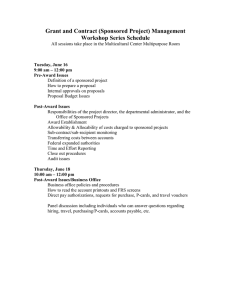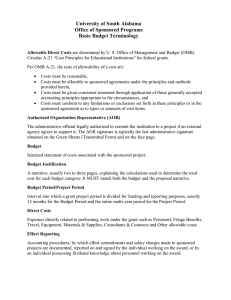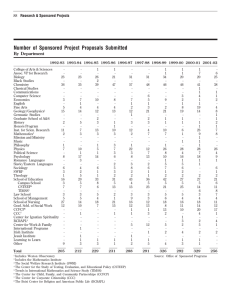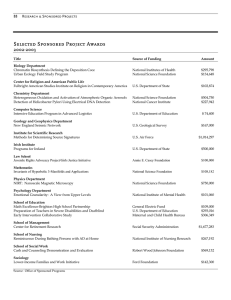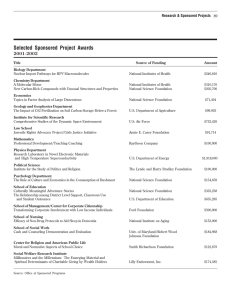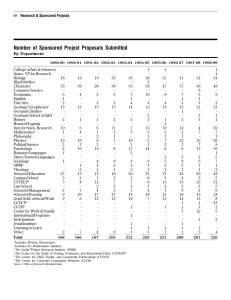FINANCIAL GUIDELINE Subject: Allowability of Costs
advertisement
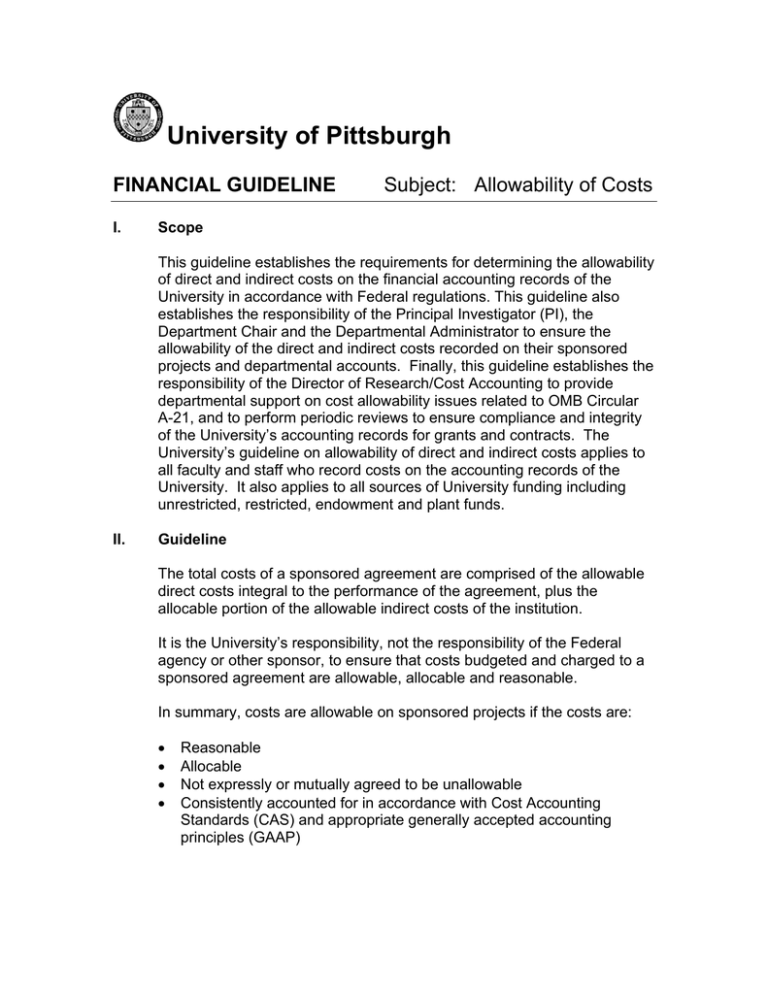
University of Pittsburgh FINANCIAL GUIDELINE I. Subject: Allowability of Costs Scope This guideline establishes the requirements for determining the allowability of direct and indirect costs on the financial accounting records of the University in accordance with Federal regulations. This guideline also establishes the responsibility of the Principal Investigator (PI), the Department Chair and the Departmental Administrator to ensure the allowability of the direct and indirect costs recorded on their sponsored projects and departmental accounts. Finally, this guideline establishes the responsibility of the Director of Research/Cost Accounting to provide departmental support on cost allowability issues related to OMB Circular A-21, and to perform periodic reviews to ensure compliance and integrity of the University’s accounting records for grants and contracts. The University’s guideline on allowability of direct and indirect costs applies to all faculty and staff who record costs on the accounting records of the University. It also applies to all sources of University funding including unrestricted, restricted, endowment and plant funds. II. Guideline The total costs of a sponsored agreement are comprised of the allowable direct costs integral to the performance of the agreement, plus the allocable portion of the allowable indirect costs of the institution. It is the University’s responsibility, not the responsibility of the Federal agency or other sponsor, to ensure that costs budgeted and charged to a sponsored agreement are allowable, allocable and reasonable. In summary, costs are allowable on sponsored projects if the costs are: • • • • Reasonable Allocable Not expressly or mutually agreed to be unallowable Consistently accounted for in accordance with Cost Accounting Standards (CAS) and appropriate generally accepted accounting principles (GAAP) University of Pittsburgh FINANCIAL GUIDELINE II. Subject: Allowability of Costs Guideline (con’t) Costs are reasonable if the nature of the goods and services acquired and the amount involved reflect the action that a prudent business person would have taken under the circumstances. Major considerations involved in the determination of the reasonableness of a cost include: • • • • Whether or not the cost is of a type generally recognized as necessary for the operation of the institution or the performance of the sponsored agreement Requirements imposed by such factors as arm’s-length bargaining, Federal and State laws and regulations, and sponsored agreement terms and conditions Whether or not the individual concerned acted with due prudence in the circumstances, considering their responsibilities to the institution, its employees, its students, the Federal Government, and the public at large The extent to which the actions taken with respect to the incurrence of the cost are consistent with established institutional policies and practices applicable to the work of the institution in general, including sponsored agreements A cost is allocable to a particular cost objective if the goods or services are chargeable or assignable to such cost objective in accordance with the relative benefits received or other equitable relationship. A cost objective is defined as a specific function, project, sponsored agreement or department. A cost can be allocable to a cost objective either as a direct cost or indirect cost, but not both. Further, a cost is allocable to a sponsored agreement as a direct or indirect cost if: • • • It is incurred solely to advance the work under the sponsored agreement It benefits both the sponsored agreement and other work of the institution, in proportions that can be approximated through use of reasonable methods It is necessary to the overall operation of the institution and is deemed to be assignable in part to sponsored projects University of Pittsburgh FINANCIAL GUIDELINE II. Subject: Allowability of Costs Guideline (con’t) Any costs allocable to a particular sponsored agreement may not be shifted to other sponsored agreements in order to: • • • meet deficiencies caused by overruns or other fund considerations avoid restrictions imposed by law or by terms of the sponsored agreement simplify the accounting for sponsored projects or for other reasons of convenience Any costs allocable to non-Federal activities may not be shifted to Federally sponsored agreements or activities. An expressly unallowable cost is a cost that is unallowable by law or regulation. An example of an expressly unallowable cost would be alcoholic beverages. Reference the attached for a comprehensive list of costs that are expressly unallowable in accordance with OMB Circular A21. A mutually agreed to unallowable cost is unallowable by mutual agreement or contract. A mutually agreed to unallowable cost can be any cost that a sponsor and the University agree will not be recovered on a grant or contract, typically initiated by the sponsor. Expressly or mutually agreed to unallowable costs cannot be charged either directly or indirectly to sponsor awards since they are not allowable costs of such awards. Costs are consistently accounted for when, based on the applicable facts and circumstances of the situation, they are: • accounted for in accordance with the applicable GAAP • accounted for in accordance with the University’s accounting practices disclosed in its CAS Disclosure Statement (DS-2) submitted to the U.S. Government • consistently recorded as either direct or indirect costs • consistently recorded as either allowable or unallowable costs • consistently recorded to Federal and non-Federal sponsors without bias • consistently recorded to the same sponsor This accounting consistency must be maintained across the entire University. University of Pittsburgh FINANCIAL GUIDELINE II. Subject: Allowability of Costs Guideline (con’t) Consequences of noncompliance with the proper determination of the allowability of costs can result in the assessment of fines and penalties to the University. Proper recording of costs in the University’s accounting records facilitates the accounting for sponsored projects and the preparation of the University’s indirect cost rate. On a test basis, the Office of Financial Information will perform periodic reviews of the determination of the allowability of costs and recording of transactions to ensure consistency and compliance with this Guideline. III. Definitions Allocate – to assign an item of cost or group of costs to one or more cost objectives. Cost Objective – a function, organizational subdivision, sponsored agreement or other work unit for which cost data are desired and for which provision is made to accumulate and measure the cost. Departmental/Research Administrator – the individual designated by the department or Principal Investigator who is responsible for the financial accounting, budgeting and administration of the department’s sponsored awards. Direct Cost – those costs that can be identified specifically with a particular sponsored project, an instructional activity, or any other institutional activity or that can be directly assigned to such activities relatively easily with a high degree of accuracy. Directly Associated Cost – any cost that is generated solely as a result of the incurrence of another cost, and which would not have been incurred had the other cost not been incurred. Indirect or Facilities and Administrative (F&A) Costs – those costs that are incurred for common or joint objectives and therefore cannot be identified readily and specifically with a particular sponsored project, an instructional activity or any other institutional activity. University of Pittsburgh FINANCIAL GUIDELINE III. Subject: Allowability of Costs Definitions (con’t) Principal Investigator – the individual designated by the sponsoring agency who is responsible and accountable for the proper conduct and direction of the project or activity. At the discretion of the Dean, a principal investigator for sponsored programs is typically a tenured or tenured stream faculty but can also include other members of the academic community such as research associates or non-tenure stream research/clinical faculty. IV. References OMB Circular A-21 C. OMB Circular A-21 Appendix A. CAS 9905.502 OMB Circular A-21 Appendix A. CAS 9905.505 PHS Grants Policy Statement NIH Grants Policy Statement NSF Grants Policy Statement University of Pittsburgh FINANCIAL GUIDELINE Subject: Allowability of Costs Summary Of Expressly Unallowable Costs Reference OMB Circular A-21 Category J. 1. f. Advertising and public relations costs such as costs of convocations, displays, demonstrations, exhibits, shows, special events, promotional items, gifts, souvenirs, and other advertising and public relations designed to promote the institution including directly associated costs. J. 2. Alcoholic beverages including those costs incurred while on travel status. J. 3. Costs of Alumni activities. J. 4. Bad debt expense. J. 5. Civil defense costs not on the institution’s premises. J. 6. Commencement and convocation costs. J. 8. g. Institutional furnished automobiles for personal use. J. 9. Contingency provisions (reserves). J. 13 Donations and contributions (value of donated services and property). J. 15. Entertainment costs. J. 16. Capital expenditures for general purpose equipment and capital improvements unless approved in advance by the sponsoring agency. J. 17. Executive lobbying. University of Pittsburgh FINANCIAL GUIDELINE Subject: Allowability of Costs Summary Of Expressly Unallowable Costs Reference OMB Circular A-21 Category J. 18. Fines and penalties. J. 19. Goods or services for personal use. J. 20. Housing and personal living expenses. J. 22. Fund raising, financial campaigns, endowment drives, gift solicitation, and similar expenses. J. 24. Generally, lobbying costs and that portion of memberships & dues costs that represent lobbying performed by the organization. J. 25. Losses or overruns (excess costs over revenue) on sponsored agreements. J. 28. Memberships and dues in community, social, country club or dining organizations; and any direct charge to a sponsored project unless approved in advance by the sponsor under a major program. J. 31. Pre-agreement (or post-agreement) costs incurred prior/subsequent to the period of performance of the award without the approval of the sponsoring agency. J. 37. d. Direct or indirect relocation costs where the newly hired employee resigns within 12 months. J. 42. Costs of selling and marketing any products or services of the institution. J. 45. Student activity costs such as intramural activities, student publications, student clubs, etc.
